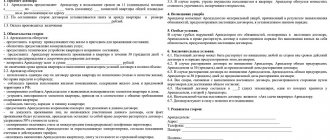When a child necessarily participates in privatization
- If the child is not registered in a municipal apartment, but one of his parents is registered.
- If the child was registered in the apartment, but he was discharged and registered in another place.
- If the child and his parent have been discharged from the municipal apartment and registered elsewhere.
- The parent who is registered in the apartment will formalize a refusal to participate in the privatization. It does not matter whether the child was registered or not.
Explanation: Clause 2 Art. 20 of the Civil Code of the Russian Federation - “The place of residence of minors is the place of residence of their legal representatives - parents, adoptive parents or guardians.” In simple words, according to the law, a child from birth receives the right to live with his parents. As a child, he has the right to use a municipal apartment in which one of his parents is registered.
A child under 18 years of age does not independently determine where to live. This is determined for him by his parents/guardians - Art. 54, art. 55 and art. 63 RF IC. Since a child cannot independently exercise his housing rights (determine his place of residence), he cannot lose the right to use a municipal apartment, even when he was discharged from it (separately or together with his parent).
Art. 7 of the Law on Privatization dated 04.07.1991 N 1541-1 - “The contract for the transfer of residential premises into ownership includes minors who have the right to use this residential premises and live together with persons to whom this residential premises is transferred into common ownership with minors, or minors, living separately from these persons, but who have not lost the right to use this residential premises.” In simple words, a child must participate in privatization, even if he is not registered in the apartment, but one of his parents is registered in it.
Privatization of an apartment with a minor child - basic rules
- If only children who have not yet reached the age established by legislative acts for independent participation in the transaction live in the privatized residential premises , then this real estate is transferred to them based on the consent of their parents, guardians or adoptive parents. It is worth remembering that such a procedure will also require the consent of the guardianship authority.
- If the children's parents have died , then, according to the existing application from the current guardianship authority, this property must also be transferred into full ownership of the children within a full 3 months. And if the minor is currently over 14 years old, then he will have to draw up such an agreement on his own, guided by the permission and assistance of the relevant guardianship authority.
- For a minor, there is also a limitation in the generally accepted rule that privatization of residential premises is possible only once in a lifetime. Children who have become full owners of residential premises through privatization have the full right to privatize real estate after they reach adulthood.
Initially, the legislative act under which the entire process of privatization of residential premises was carried out did not contain such a norm, thus grossly violating all the rights of a minor. Only later, in 1994, were separate amendments made that began to protect the interests and rights of minors.
We recommend reading: Rentiers on dorm rooms
When can you privatize an apartment without a child?
- If the child has never been registered in a municipal apartment, and his parent was discharged before privatization and will not participate in it.
Instructions on how to leave the apartment. When an adult citizen independently checks out of a municipal apartment, he voluntarily renounces the right to live in it and loses it from the moment of checkout. And once a citizen loses the right of residence, his child also loses this right - according to the logic of the above paragraph 2 of Art. 20 Civil Code of the Russian Federation. This is indicated in paragraph 3 of Art. 83 of the Housing Code of the Russian Federation - “If the tenant and members of his family leave for another place of residence, the social rental agreement for residential premises is considered terminated from the date of departure.” Also in Art. 7 of the Law on Privatization dated 04.07.1991 N 1541-1 - “The contract for the transfer of residential premises into ownership includes minors who have the right to use this residential premises and live together with persons to whom this residential premises is transferred into common ownership with minors, or minors, living separately from these persons, but who have not lost the right to use this residential premises.” - If the child has never been registered in a municipal apartment, and his parent was discharged by court decision.
Here it is the same as in the first case, only the parent and child lose the right from the moment the court decision enters into force - Art. 209 and Art. 210 Code of Civil Procedure of the Russian Federation. - If the parent left the apartment before the birth of the child or was discharged by court decision. This is similar to the situations above.
How to privatize a municipal apartment and what documents to collect.
Services that will help solve similar issues
A typical case. Buying and selling an apartment on the secondary market. The buyer and seller shook hands, and realtors and lawyers got involved.
And then the buyer’s lawyers discovered a catch that put the deal in jeopardy. The received archival extract showed that two minor children 11 years ago were discharged from this apartment less than 3 months before privatization, which, according to lawyers, is an infringement of their rights, due to which they can file a lawsuit demanding that the transaction be declared invalid with an unpredictable result . As a way out, they, averting their eyes, suggest that the seller find these children and take from them a notarized statement, ATTENTION: “That they are aware that their rights were violated during the privatization of the apartment in 2006, that they now know that this apartment is for sale and they have no claims regarding the apartment and the transaction.” It's cute, isn't it?
The seller shrugs. The buyer, bowing his head (he liked the apartment), is forced to refuse it in the face of a significant risk of losing the purchased property in the event of a claim from these now 19-year-old children, since, as lawyers inform the plaintiff, the statute of limitations is 3 years! from the day these children come of age, i.e. in this case, another 2 years. The deal falls apart. The buyer and seller are at a loss. Lawyers receive medal for vigilance
We decided to find out whether the nightmare of all purchasers in the secondary market really continues, and their peace of mind and serene life in a new apartment depend only on chance, and whether all lawyers working in real estate agencies have the necessary qualifications, and turned to a lawyer with 14 years of experience conducting civil cases in court specializing in housing, family, inheritance, land, etc. right to Vera Germanovna Zaitseva.
- Article 181 of the Civil Code on the invalidity of transactions has changed its wording since 2013, reports Vera Germanovna. Now the maximum period for a person who is not a party to the transaction to demand termination of the transaction is 10 years from the date of completion of the disputed transaction.
- The statute of limitations of 3 years from the date of majority has been abolished since 2013.
- The statements that NA lawyers ask from these persons (former minor children) do not have judicial force, since a person cannot waive his constitutional right to go to court. They are not needed by the future buyer, but only to demonstrate the zeal of the lawyers themselves.
- The norm “to discharge minors no earlier than 6 months before privatization” has never been legally prescribed anywhere. This is the creativity of the masses! Even if the child was never registered in the apartment, but at the time of privatization he lived there (according to witness testimony) and did not participate in the privatization, he is considered to be infringed by his parents in his rights. Therefore, a clean archival extract is not a guarantee, contrary to the opinion of the legal department of the Academy of Sciences, that the apartment is 100% clean
In connection with the listed changes in the Civil Code since 2013, according to the observations of V.G. there have been few lawsuits regarding the invalidity of real estate acquisition transactions.
Formally, these grown children can file a claim, but 99.9% of the time, they will achieve nothing.
Principle (1) of legal practice – stability of civil legal relations (hence – courts seek to prevent the termination of transactions involving bona fide purchasers)
Principle (2) of legal practice - a pre-trial period for the right to file a claim (at first they introduced the concept of “bona fide purchaser”, it had little effect; then in 2013 they introduced the maximum pre-trial period - 10 years from the date of completion of the disputed transaction, it had a good effect)
Principle (3) of legal practice - equality of parties in a legal dispute (hence - former minors have the formal right to file a claim (their constitutional right); if they file, the court will be obliged to consider, according to V.G. Zaitseva, they will lose 99.9% , but they will fray your nerves; the recommendation is not to look for them and not to take statements, especially since they do not have judicial force. See explanation above)
There were cases of satisfaction of the claim of former minors who were infringed on the right of privatization. But, in most cases, these are claims by children who have become adults against their parents, who at the time of filing the claim continued to live in the privatized apartment. The court obliged the parents to allocate a share in such an apartment to these (already grown) children. These were not claims against bona fide purchasers of this apartment. In the only case of this kind from the practice of V.G. Zaitseva, when a claim in a similar situation was brought against the property of a bona fide purchaser, the court refused to satisfy the plaintiff.
That. We see that the risk identified by the buyer's lawyers is extremely exaggerated. That at times, the arguments of even professional lawyers of the Academy of Sciences, which seem undeniable, need to be checked and corrected by lawyers with experience in judicial practice.
Can a child refuse privatization?
If parents want their child to refuse to participate in privatization, they need to obtain permission from guardianship and trusteeship. Without permission, they will not draw up a privatization agreement, because the child is waiving his rights. Clause 2 Art. 37 of the Civil Code of the Russian Federation and clause 1 of Art. 21 of the Federal Law on Guardianship - “The guardian does not have the right, without the prior permission of the guardianship and trusteeship authority, to carry out, and the trustee does not have the right to consent to, transactions for the alienation, including the exchange or donation of the ward’s property, leasing it (lease), for free use or as collateral, transactions entailing the renunciation of the rights belonging to the ward, the division of his property or the allocation of shares from it, as well as any other actions entailing a decrease in the property of the ward.”
Naturally, the guardianship authorities will not give permission, because if the child refuses privatization, an infringement of his rights is revealed. According to the law, the child’s parents must protect his rights, but here the opposite happens. Clause 1 Art. 64 of the RF IC - “Parents are the legal representatives of their children and act in defense of their rights and interests in relations with any individuals and legal entities, including in the courts, without special powers.”
Privatization of an apartment with minor children: documents
Privatization is a procedure for transferring real estate into private hands, which involves registration of ownership. Privatization of an apartment with minor children is a complex process that has a number of features and nuances. Often, difficulties arise due to ignorance of the legislative norms relating to this process, because the procedure requires strict compliance with them.
- statements from all participants,
- social tenancy agreement,
- photocopies of passports,
- Photocopies of birth certificates will be required (for children under 14 years old),
- official consent of the guardianship authorities,
- technical and cadastral passports,
- certificate or extract from the house register,
- documents confirming that participation in privatization processes has not previously been carried out,
- documentation confirming the complete absence of debts on utility bills,
- notarized consents from persons wishing to refuse to participate in privatization,
- power of attorney for representing the interests of representatives of minors, certified by a notary.
We recommend reading: Is a mortgage taken into account when recognizing a low-income family?
Child’s participation in collecting documents
If the child is under 14 years old, his presence is not required anywhere. One of the parents/guardian must do everything for him - collect the necessary documents, sign the privatization agreement and submit it for registration - Art. 28 Civil Code of the Russian Federation. If he is between 14 and 18 years old, he and his parent must collect documents, sign applications and a privatization agreement - Art. 26 Civil Code of the Russian Federation.
If you have questions, you can consult for free. To do this, you can use the form below, the online consultant window and telephone numbers (24 hours a day, seven days a week): 8 Moscow and region; 8 (812) 425-62-89 — St. Petersburg and region; all regions of the Russian Federation.
The director of the legal service “Unified Center for Protection” (edin.center) Konstantin Bobrov answers:
Minors registered in residential premises have the right to live there on an equal basis with their parents. And in no way can they be limited in this. This right is guaranteed to them by housing legislation, which predetermines the right of minors to participate in the privatization of housing.
The Law “On the Privatization of the Housing Stock of the Russian Federation” directly establishes the right of minors registered in housing to privatize it. Parents are responsible for ensuring their participation. In the privatization process, parents will act as their legal representatives: on their behalf they will sign, draw up the necessary documents, negotiate, and so on.
In this case, the child is not registered, therefore, he should not participate in privatization.
Parents can refuse privatization for minors only after receiving the consent of the guardianship and trusteeship authority, which is designed to protect the interests of children. But obtaining such consent is very difficult.
Is it possible to challenge privatization because of a child?
How is the apartment divided if I was born before privatization and my sister was born after?









